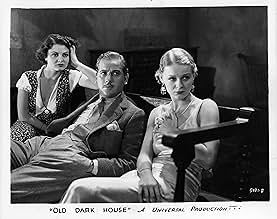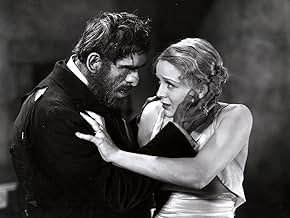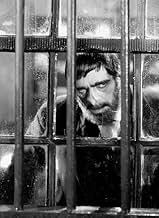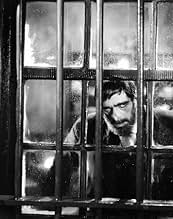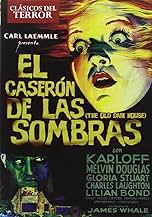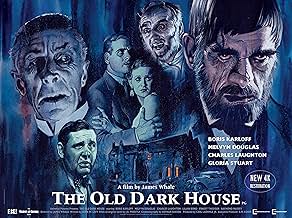Seeking shelter from a storm, five travelers are in for a bizarre and terrifying night when they stumble upon the Femm family estate.Seeking shelter from a storm, five travelers are in for a bizarre and terrifying night when they stumble upon the Femm family estate.Seeking shelter from a storm, five travelers are in for a bizarre and terrifying night when they stumble upon the Femm family estate.
- Director
- Writers
- Stars
- Awards
- 1 nomination total
- Director
- Writers
- All cast & crew
- Production, box office & more at IMDbPro
7.014.5K
1
2
3
4
5
6
7
8
9
10
Featured reviews
Superb sets and photography but ultimately just a well played farce
Director James Whale and his cast probably had a good time making this film. After the opening credits there's a "producer's note": 'Karloff, the mad butler in this production, is the same Karloff who created the part of the mechanical monster in "Frankenstein". We explain this to settle all disputes in advance, even though such disputes are a tribute to his great versatility.'
So you're know what you're in for, at least modern audiences should. Back then it must have been quite daring to openly "expose" and perhaps even undermine the potential scariness of the film, especially Karloff's role as the butler. I think many executives at Universal frowned upon this as well, in particular Carl Laemmle Sr., but Carl Laemmle Jr. probably shared the same kind of humor as Whale, so they let him get away with it.
The film is very loyal to J.B. Priestley's novel "Benighted" and took most of the wonderful dialogs and one-liners directly from the book. As one would expect from James Whale en co, the sharply written dialog is definitely one of the highlights with the best lines being handed to Thesiger, as in THE BRIDE OF FRANKENSTEIN. This supposedly being a send-up of Universal's horror conventions, it's not particularly engaging as a horror film. Eerie things do happen, absolutely, but they are so bizarre and sometimes so utterly over the top, that you either stop caring about the characters or simply lose track of the proceedings at all. But no complaints about the acting, especially the incomparable Ernest Thesiger who is a standout in a first rate cast. And the sets and photography are absolutely superb as is the whole atmosphere in general, largely due to the continuously (and well timed) stormy soundtrack, which greatly adds to the fun.
Many have pointed out that Whale presents us some kind of parody of the horror movie or some kind of archetypal English household. This seems a very modern, almost anachronistic vision to me. What things did he attempt to mock or make fun of? Essentially THE OLD DARK HOUSE is a well acted sometimes very funny stagy farce with a horror atmosphere at best. He certainly had the last laugh because he probably never intended it that way, although most of the critical acclaim came after his death.
A final note on the Special Collector's Edition DVD: Besides the obligatory stills gallery, nothing of particular interest. A six-minute interview with Curtis Harrington about him saving the original copy of the film. Good thing he did it but that's all we need to know. And truly worthless commentary tracks, James Curtis comments like he's reading a list with all kinds of facts about the movie. Suitable for a booklet, not for an audio commentary.
Camera Obscura --- 8/10
So you're know what you're in for, at least modern audiences should. Back then it must have been quite daring to openly "expose" and perhaps even undermine the potential scariness of the film, especially Karloff's role as the butler. I think many executives at Universal frowned upon this as well, in particular Carl Laemmle Sr., but Carl Laemmle Jr. probably shared the same kind of humor as Whale, so they let him get away with it.
The film is very loyal to J.B. Priestley's novel "Benighted" and took most of the wonderful dialogs and one-liners directly from the book. As one would expect from James Whale en co, the sharply written dialog is definitely one of the highlights with the best lines being handed to Thesiger, as in THE BRIDE OF FRANKENSTEIN. This supposedly being a send-up of Universal's horror conventions, it's not particularly engaging as a horror film. Eerie things do happen, absolutely, but they are so bizarre and sometimes so utterly over the top, that you either stop caring about the characters or simply lose track of the proceedings at all. But no complaints about the acting, especially the incomparable Ernest Thesiger who is a standout in a first rate cast. And the sets and photography are absolutely superb as is the whole atmosphere in general, largely due to the continuously (and well timed) stormy soundtrack, which greatly adds to the fun.
Many have pointed out that Whale presents us some kind of parody of the horror movie or some kind of archetypal English household. This seems a very modern, almost anachronistic vision to me. What things did he attempt to mock or make fun of? Essentially THE OLD DARK HOUSE is a well acted sometimes very funny stagy farce with a horror atmosphere at best. He certainly had the last laugh because he probably never intended it that way, although most of the critical acclaim came after his death.
A final note on the Special Collector's Edition DVD: Besides the obligatory stills gallery, nothing of particular interest. A six-minute interview with Curtis Harrington about him saving the original copy of the film. Good thing he did it but that's all we need to know. And truly worthless commentary tracks, James Curtis comments like he's reading a list with all kinds of facts about the movie. Suitable for a booklet, not for an audio commentary.
Camera Obscura --- 8/10
"Have a Potato.....Have a Potato"
Truly one of Universal greatest unsung horror films, The Old Dark House is a unique blend of gothic setting, quirky characterizations, wicked black and dry humour, a great ensemble cast, and the workings of the mind of James Whale. Whale made the film the year after Frankenstein. He was again paired with Karloff. But unlike their first association, Karloff's star is far less brighter in this film as his performance, although good and servicable, is over-shadowed by atmosphere, Whale's direction, witty dialogue, and a cast of scene stealers such as Melvyn Douglas, Charles Laughton, Eva Moore, and Ernest Thesiger. Others in the notable cast include lovely Gloria Stuart, Lillian Bond, and Raymond Massey. Thesiger and Moore, as the brother and sister imposed upon by travellers in the stormy night, are fantastic as they interact and play out their eccentricities to perfection. Thesiger has the choice lines in the film as the effeminate Horace Femm, a cowardly man that cowers to his deaf sister. He is a joy to watch and each of his lines oozes with oil. Moore is also very good as she bellows repeatedly, "N beds! No beds! They can have no beds!" The story is based on a novel by J. B. Priestly. The plot is somewhat antiquated now, but Whale's direction puts a lot of life into it. And let's not forget Karloff, however small his part, still turns in a great menacing performance as a lecherous, drunken servant named Morgan ogling Gloria Stuart from the moment he sees her. The Old Dark House is a great film, and it should be more highly touted by Universal!
James Whale's weirdest film and a visual treat
It's one of director James Whale's most offbeat films along with "Bride of Frankenstein" (IMHO his masterpiece). It's based on the J.B. Priestley novel and it was filmed during the Pre-Code Era. I'd say it's a mixture of horror film, spoof and black comedy...in some aspects it's related to "Arsenic and Old Lace", although it has a darker mood.
On a very stormy night, a group of travelers find shelter in an eerie and scary welsh manor, inhabited by the "weird" Femm family, and there begins a quick chain of events (the film lasts only 72 minutes) until the film's conclusion. The weary and wet travelers include Raymond Massey and Gloria Stuart as a married couple who are traveling through the country with happy-go-lucky friend Mr. Penderel, played by Melvyn Douglas. Other travelers who arrive to this Huge House, are Charles Laughton, playing a rich businessman of humble origins with his lover, Lillian Bond, who's great and very sexy in her role of a joyous chorus-girl.
Then we have the Femms: Religion fanatic Rebecca Femm, who has an obsession with "sinners", expertly played by sinister-looking Eva Moore; her wishy-washy brother Horace Femm, played by the great Ernest Thesiger, who impersonated "Dr. Pretorius" in "Bride of Frankenstein"; 102 years old Sir Roderick Femm, who is played by actress Elspeth Dudgeon, who's listed in the cast as "John" Dudgeon (creepy character!) and "seemingly harmless" psychopath and pyromaniac Saul Femm, played by Brember Wills.
Boris Karloff deserves to be mentioned apart, who impersonates the scarred butler, Morgan, who lusts after Mrs. Waverton (Gloria Stuart), perhaps because she gets to wear a sexy 1930s low-cut dress, the type which pre-Code Jean Harlow wore.
Whale's direction is excellent. I was especially impressed with the shot of the front of the spooky old house in which the Femms reside as seen from the eyes of the passengers in the car. Whale liked to use a subjective camera, which was unusual for many early thirties movies. The camera is the viewer as that viewer moves through the scenes.
Best of all was the late Gloria Stuart's commentary on the Kino DVD, which was excellent. She is such a pleasure to listen to as she reminisces about the movie, and talks all about everyone involved. I never would've known anything about the brilliant actress Eva Moore if it wasn't for her great commentary. She provides so much insight, and is so funny and charming at the same time. She also talks about other things, and other aspects of her career. It's almost like having a conversation with her, she's that relaxed. She speaks very highly of James Whale, and says that he's the best director she ever worked with. She points out different aspects of his filming, especially his use of shadows. She says that making this movie was the high point of her career, and that she never made another movie that she enjoyed working on as much as this one. Take that James Cameron!
Highly recommended.
On a very stormy night, a group of travelers find shelter in an eerie and scary welsh manor, inhabited by the "weird" Femm family, and there begins a quick chain of events (the film lasts only 72 minutes) until the film's conclusion. The weary and wet travelers include Raymond Massey and Gloria Stuart as a married couple who are traveling through the country with happy-go-lucky friend Mr. Penderel, played by Melvyn Douglas. Other travelers who arrive to this Huge House, are Charles Laughton, playing a rich businessman of humble origins with his lover, Lillian Bond, who's great and very sexy in her role of a joyous chorus-girl.
Then we have the Femms: Religion fanatic Rebecca Femm, who has an obsession with "sinners", expertly played by sinister-looking Eva Moore; her wishy-washy brother Horace Femm, played by the great Ernest Thesiger, who impersonated "Dr. Pretorius" in "Bride of Frankenstein"; 102 years old Sir Roderick Femm, who is played by actress Elspeth Dudgeon, who's listed in the cast as "John" Dudgeon (creepy character!) and "seemingly harmless" psychopath and pyromaniac Saul Femm, played by Brember Wills.
Boris Karloff deserves to be mentioned apart, who impersonates the scarred butler, Morgan, who lusts after Mrs. Waverton (Gloria Stuart), perhaps because she gets to wear a sexy 1930s low-cut dress, the type which pre-Code Jean Harlow wore.
Whale's direction is excellent. I was especially impressed with the shot of the front of the spooky old house in which the Femms reside as seen from the eyes of the passengers in the car. Whale liked to use a subjective camera, which was unusual for many early thirties movies. The camera is the viewer as that viewer moves through the scenes.
Best of all was the late Gloria Stuart's commentary on the Kino DVD, which was excellent. She is such a pleasure to listen to as she reminisces about the movie, and talks all about everyone involved. I never would've known anything about the brilliant actress Eva Moore if it wasn't for her great commentary. She provides so much insight, and is so funny and charming at the same time. She also talks about other things, and other aspects of her career. It's almost like having a conversation with her, she's that relaxed. She speaks very highly of James Whale, and says that he's the best director she ever worked with. She points out different aspects of his filming, especially his use of shadows. She says that making this movie was the high point of her career, and that she never made another movie that she enjoyed working on as much as this one. Take that James Cameron!
Highly recommended.
A Collection of Weirdos
First one carload of normal people who can't go on due to flash flooding stop in a Gothic horror house for food and shelter and then another. Strange doings are happening at the house occupied by the Femm family and their mute servant Morgan.
You can't really say there is any kind of coherent plot to the unfolding events and plot for me is usually the one indispensable part of any film. But in this case I make an exception because obviously Director James Whale was having a little fun with the audience by now used to Universal Studios horror film products. Whale creates a film of dark moods and light banter among the guests who can't quite figure out what's with this family of weirdos.
The Old Dark House marked the American film debut of Charles Laughton and Laughton overacts outrageously as does the whole cast in the role a bluff, overbearing, but essentially good hearted Manchester businessman who's got himself a Sir before his name and is right proud of it. This was also early work for Melvyn Douglas and Raymond Massey as another two of the guests.
Boris Karloff plays the sinister and mute servant Morgan. Karloff had one of the great speaking voices ever in films and interesting that this and his break through role as the Frankenstein monster required no dialog.
The Old Dark House is one great Halloween movie and listen close to the campy dialog that will tickle your funny bone if you don't miss it.
You can't really say there is any kind of coherent plot to the unfolding events and plot for me is usually the one indispensable part of any film. But in this case I make an exception because obviously Director James Whale was having a little fun with the audience by now used to Universal Studios horror film products. Whale creates a film of dark moods and light banter among the guests who can't quite figure out what's with this family of weirdos.
The Old Dark House marked the American film debut of Charles Laughton and Laughton overacts outrageously as does the whole cast in the role a bluff, overbearing, but essentially good hearted Manchester businessman who's got himself a Sir before his name and is right proud of it. This was also early work for Melvyn Douglas and Raymond Massey as another two of the guests.
Boris Karloff plays the sinister and mute servant Morgan. Karloff had one of the great speaking voices ever in films and interesting that this and his break through role as the Frankenstein monster required no dialog.
The Old Dark House is one great Halloween movie and listen close to the campy dialog that will tickle your funny bone if you don't miss it.
Another gem courtesy of James Whale!
The Old Dark House is the least well known of James Whale's four horror pictures, but don't let that fool you, as this one is just as good as anything else Whale ever made. Despite being over seventy years old, The Old Dark House still holds the power to feel like it could have been released yesterday; much like the rest of Whale's horror movies, which are as fresh today as they were the day they were made. The plot follows three people that get caught in a storm and are forced to take refuge in the only place nearby - an old dark house. There, they encounter the house's strange inhabitants - a nearly deaf woman and a cowardly old man, along with their creepy butler (played by Boris Karloff), a scar faced drunk. More travellers turn up, and the film only gets more fun; introducing us to more strange characters, including a very weird old lady...with a beard, and something else, which is so horrible that the inhabitants are forced to keep it under lock and key
The Old Dark House is one of the first haunted house films ever made, and it works, primarily, for two reasons; the house itself and the cast of characters. Both of these entities are intriguing elements in their own right, and they combine to great effect. The house is, as you might expect, old and dark; and it's a sublime horror setting because of that. It creates a constant sense of malice and through it's dark corridors and many rooms, Whale is able to make the house into a labyrinth where we can believe that anything can happen. This coupled with the fact that the 'normal' people in the house are stranded there, thus creating claustrophobia along with the raging storm outside makes for an atmosphere that is as dark and morbid as anything that cinema has ever given us. The characters inside the house are enigma's themselves; each one is as frightening and inventive as the other, and they have all been imitated several times by later horror films. Even the travellers that are stranded in the house are given unique to each other. Whale also uses a few of these characters to implement his own brand of black humour (which can be felt strongly in his other three films as well). Many horror films don't work character-wise because they're all so similar to each other; but this film certainly doesn't suffer from that.
Overall, The Old Dark House is another feather in Whale's already feather filled cap. It's as genius as any of his other horror films and overall it's a crying shame that Whale didn't do more work in that genre, as that is the genre that is so rightfully his. If I haven't made it clear enough already: this film comes with the highest recommendation from me.
The Old Dark House is one of the first haunted house films ever made, and it works, primarily, for two reasons; the house itself and the cast of characters. Both of these entities are intriguing elements in their own right, and they combine to great effect. The house is, as you might expect, old and dark; and it's a sublime horror setting because of that. It creates a constant sense of malice and through it's dark corridors and many rooms, Whale is able to make the house into a labyrinth where we can believe that anything can happen. This coupled with the fact that the 'normal' people in the house are stranded there, thus creating claustrophobia along with the raging storm outside makes for an atmosphere that is as dark and morbid as anything that cinema has ever given us. The characters inside the house are enigma's themselves; each one is as frightening and inventive as the other, and they have all been imitated several times by later horror films. Even the travellers that are stranded in the house are given unique to each other. Whale also uses a few of these characters to implement his own brand of black humour (which can be felt strongly in his other three films as well). Many horror films don't work character-wise because they're all so similar to each other; but this film certainly doesn't suffer from that.
Overall, The Old Dark House is another feather in Whale's already feather filled cap. It's as genius as any of his other horror films and overall it's a crying shame that Whale didn't do more work in that genre, as that is the genre that is so rightfully his. If I haven't made it clear enough already: this film comes with the highest recommendation from me.
Did you know
- TriviaThis was Boris Karloff's first credited starring role. His name had been left off the Frankenstein (1931) publicity packages and only credited in the end credits of that film.
- GoofsAt the table, with Penderel, Saul Femm is holding the curved-bladed knife, the curved edge changes from top to bottom between takes.
- Quotes
Rebecca Femm: [feels the fabric of Margaret Waverton's low-cut gown] Fine stuff, but it'll rot.
Rebecca Femm: [touches Margaret's skin above the neckline] Finer stuff still, but it'll rot too!
- Crazy creditsBefore the Universal Pictures logo: PRODUCER'S NOTE: - Karloff, the mad butler in this production, is the same Karloff who created the part of the mechanical monster in "Frankenstein". We explain this to settle all disputes in advance, even though such disputes are a tribute to his great versatility
- ConnectionsEdited into Pale Moonlight Theater: The Old Dark House (2015)
- SoundtracksSingin' in the Rain
(uncredited)
Music by Nacio Herb Brown
Lyrics by Arthur Freed
Sung by Melvyn Douglas a cappella, with modified lyrics
[Penderel sings the song in the car as the he and the Wavertons make their way on the washed out road]
Details
Box office
- Gross US & Canada
- $25,678
- Gross worldwide
- $34,649
- Runtime
- 1h 12m(72 min)
- Color
- Aspect ratio
- 1.37 : 1
Contribute to this page
Suggest an edit or add missing content



